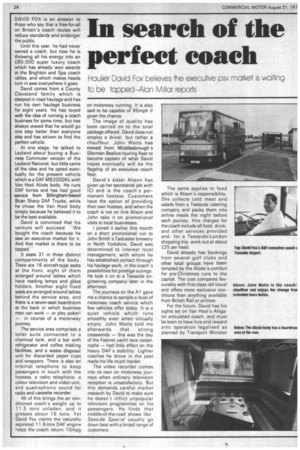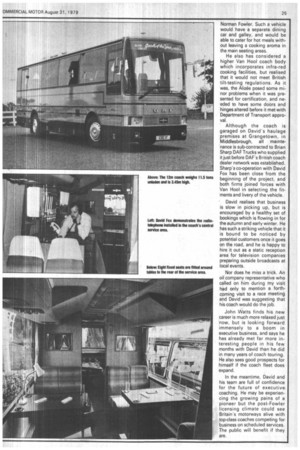In search of the
Page 26

Page 27

If you've noticed an error in this article please click here to report it so we can fix it.
perfect coach
Haulier David Fox believes e executive psv market is waiting to be tappec-Alan IVillar reports
DAVID FOX is an answer to those who say that a free-for-all on Britain's coach routes will reduce standards and endanger the public.
Until this year, he had never owned a coach, but now he is throwing all his energy into an £80,000 super luxury coach which has already won awards at the Brighton and Spa coach rallies, and which makes heads turn in awe everywhere it goes.
David comes from a County Cleveland family which is steeped in road haulage and has run his own haulage business for eight years. He has toyed with the idea of running a coach business for some time, but has always vowed that he would go one step better than everyone else and has striven to find the perfect vehicle.
At one stage, he talked to Leyland about buying a Business Commuter version of the Leyland National, but little came of the idea and he opted eventually for the present vehicle which is a DAF MB200DKL with Van Hool Alizee body. He runs DAF lorries and has had good service from Billingham-based Brian Sharp DAF Trucks, while he chose the Van Hool body simply because he believed it to be the best available.
David is convinced that his venture will succeed. "We bought the coach because he saw an executive market for it. And that market is there to be tapped."
It seats 31 in three distinct compartments of the body. There are 1 6 aircraft-type seats at the front, eight of them arranged around tables which have reading lamps and glass holders. Another eight fixed seats are arranged around tables behind the service area, and there is a seven-seat boardroom at the back in which business men can work — or play poker! — in course of a motorway journey.
The service area comprises a toilet suite connected to a chemical tank, and a bar with refrigerator and coffee making facilities, and a waste disposal unit for discarded paper cups and wrappers. There is also an internal telephone to keep passengers in touch with the hostess, a radio telephone, a colour television and video unit, and quadraphonic sound for radio and cassette recorder.
All of this brings the air conditioned coach's weight up to 11.5 tons unladen, and it grosses about 16 tons. Yet David Fox claims the naturally aspirated 11.6-litre DAF engine helps the coach return lOmpg on motorway running. It is also said to be capable of 95mph if given the chance.
The image of quality has been carried on to the total package offered. David does not employ a driver, but rather a chauffeur. John Watts has moved from Middlesbrough's Ellerman Beeline touring fleet to become captain of what David hopes eventually will be the flagship of an executive coach fleet.
David's sister Alison has given up her secretarial job with ICI and is the coach's per manent hostess. Customers have the option of providing their own hostess, and when the coach is not on hire Alison and John take it on promotional visits to local businesses.
I joined it earlier this month on a short promotional run to John Smith's Tadcaster brewery in North Yorkshire. David was determined to interest local management, with whom he has established contact through his haulage work, in the coach's possibilities for prestige outings. He took it on to a Teesside engineering company later in the afternoon.
The journeys on the Al gave me a chance to sample a level of motorway coach service which few vehicles offer today. It is a quiet vehicle which runs smoothly even when virtually empty. John Watts told me afterwards that strong crosswinds — this was the day of the Fastnet yacht race catastrophe — had little effect on the heavy DAF's stability. Lighter coaches he drove in the past made his life much harder.
The video recorder comes into its own on motorway journeys when ordinary television
reception is unsatisfactory. But this demands careful market research by David to make sure he doesn't inflict unpopular television programmes on his passengers. He finds that middle-of-the-road shows like Seaside Special usually go down best with a broad range of customers_ The same applies to food which is Alison's responsibility. She collects cold meat and salads from a Teesside catering company and packs them into airline meals the night before each journey. Hire charges for the coach include all food, drink, and other services provided and. for a Teesside-London shopping trip, work out at about
£25 per head. Top: David Fox's OAF executive coach 2 David already has bookings Teesside Airport.
from several golf clubs and other local groups have been tempted by the Alizee's comfort for pre-Christmas runs to the capital. The cost compares fav
ourably with first-class rail travel Above: John Watts is the coach': and offers more exclusive conchauffeur and enjoys the change Iron ditions than anything available extended tours duties.
from British Rail or airlines.
For the future, David has his sights set on Van Hool's Alliga tor articulated coach, and must be keen to have hire and reward
artic operation legalised as Below: The Alithe body has a boardrool planned by Transport Minister area at the rear.
Norman Fowler. Such a vehicle would have a separate dining car and galley, and would be able to cater for hot meals without leaving a cooking aroma in the main seating areas.
He also has considered a higher Van Hool coach body which incorporates infra-red cooking facilities, but realised that it would not meet British tilt-testing regulations. As it was, the Alithe posed some minor problems when it was presented for certification, and needed to have some doors and hinges altered before it met with Department of Transport approval.
Although the coach is garaged on David's haulage premises at Grangetown, in
Middlesbrough, all maintenance is sub-contracted to Brian Sharp DAF Trucks who supplied it just before DAF's British coach dealer network was established. Sharp's co-operation with David Fox has been close from the beginning of the project, and both firms joined forces with Van Hool in selecting the fitments and livery of the vehicle,
David realises that business is slow in picking up, but is encouraged by a healthy set of bookings which is flowing in for the autumn and early winter. He has such a striking vehicle that it is bound to be noticed by potential customers once it goes on the road, and he is happy to hire it out as a static reception area for television companies preparing outside broadcasts at local events.
Nor does he miss a trick. An oil company representative who called on him during my visit had only to mention a forthcoming visit to a race meeting and David was suggesting that his coach would do the job.
John Watts finds his new career is much more relaxed just now, but is looking forward immensely to a boom in executive business, and says he has already met far more interesting people in his few months with David than he did in many years of coach touring. He also sees good prospects for himself if the coach fleet does expand.
In the meantime, David and his team are full of confidence for the future of executive coaching. He may be experiencing the growing pains of a pioneer but the post-Fowler licensing climate could see Britain's motorways alive with top-class coaches competing for business on scheduled services. The public will benefit if they are.




































































































